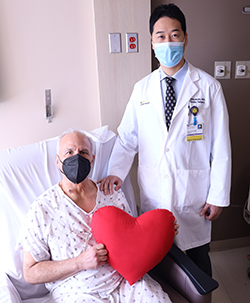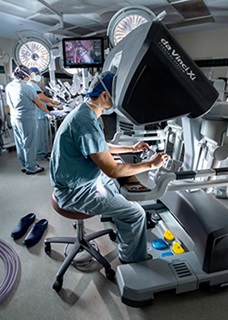MedStar Heart & Vascular Institute marks launch of new robotic cardiac surgery program
WASHINGTON — 64-year-old Brian Cohn of Northwest Washington is returning to his active life after undergoing the first robotic mitral valve surgery performed by Yuji Kawano, MD, at MedStar Washington Hospital Center. Just three days after the April 19 procedure, Cohn was discharged home, thanks to this advanced minimally invasive surgical treatment for his mitral valve.
Cohn was diagnosed with mitral valve regurgitation, a common condition in which the heart’s two mitral valve leaflets, or flaps don’t function properly, allowing blood to flow backward – in the wrong direction.

“In days, I should be back at my regular schedule with my family and friends, versus months with the old open chest approach. This is such a leap forward and I am so lucky to have met Dr. Kawano and his team,” said Cohn. “Truly amazing. Thank you from my family and from the bottom of my heart and my better-than-ever mitral valve.”
Dr. Yuji Kawano, director of the new robotic cardiac surgery program at MedStar Washington Hospital Center has extensive experience with the procedure, having previously performed more than 200 robotic heart surgeries and over 2,000 heart and vascular surgeries.
“Combining the precision of robotic instruments with a high-definition 3D camera, we are now able to perform intracardiac procedures through very tiny incisions in the chest using the da Vinci® surgical system,” said Dr. Kawano. “Robotic surgery is an excellent option for patients seeking quicker recovery and less post-surgical pain, without compromising the clinical result of the surgery itself.”
The robotic cardiac surgery program at MedStar Washington Hospital Center is the first in the area to serve the southern Maryland, greater Washington, D.C., and northern Virginia region.

Traditional heart surgery requires surgeons to open the chest to access the heart. It involves cutting through the breastbone and opening the rib cage, needing a substantial incision.
With a robotic approach, surgeons slip instruments through five very small incisions, all less than an inch, between the ribs and through the chest wall. These tools have a wider range of motion than the human hand, allowing for more intricate movements and increasing the precision of the surgical technique. The robotic technique reduces the risk of post-surgical complications like stroke, infection, and blood loss, and it shortens length of hospital stay and time for recovery. Patients also experience much less pain during their recovery because they are not healing from what is in effect a broken breastbone.
“Robotic cardiac surgery is an exciting and important next step in the evolution of the MedStar Washington Hospital Center cardiac surgery program,” said Christian Shults, MD, interim co-chair of the cardiac surgery program at MedStar Health. “Our cardiac surgery program is already recognized as one of the largest and most experienced in the entire country. Robotic cardiac surgery is the latest example of our ongoing tradition of clinical innovation and excellence.”
In addition to robotic mitral valve surgery at MedStar Washington Hospital Center, robotics will soon be used to treat other cardiac diseases like coronary artery obstructions, tricuspid valve disease, atrial fibrillation, atrial septal defects, and cardiac tumors.
Of note, MedStar Washington Hospital Center has been offering robotic surgery in other specialties since 2006. It began with robotic prostatectomy to treat prostate cancer and has now extended to include head/neck surgery, bariatric surgery, benign and malignant gynecology, urology, thoracic surgery, hernia repair, and now cardiac surgery.
Categories
Media Contact
So Young Pak
202-877-2748
soyoung.pak@medstar.net









